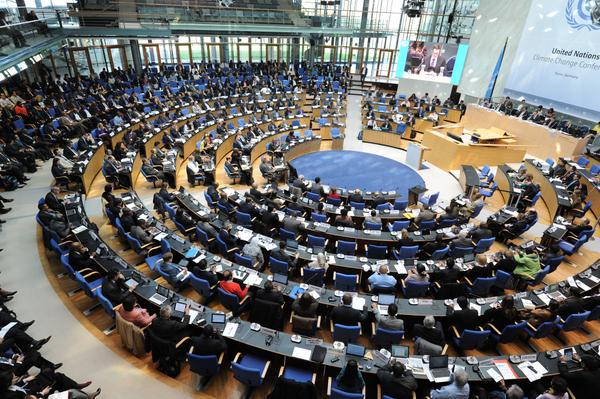As the Bonn Climate Talks launched today, France’s foreign minister Laurent Fabius urged that any climate agreement must be worded in a manner which does not require consent of the United States Congress.
“We must find a formula which is valuable for everybody and valuable for the US without going to the Congress,” said Fabius. ” … we know the politics in the US. Whether we like it or not, if it comes to the Congress, they will refuse.” (The Guardian, Climate deal must avoid US Congress approval, French minister says)
Referring to the 2015 climate negotiations as our “Last Chance Saloon”, both scientists and environmentalists are stressing the urgency of the rapidly enforcement of “steep emission cuts to keep global temperatures from rising beyond 2 degrees C. (Ecology, Last Chance Saloon)
One of the major impediments to the success of climate negotiations throughout the years remains the failure of developed nations to back up their pledges with cash to assist the developing world and those nations most vulnerable to climate change.
Editing The Climate Talkers: Punctuation’s Effect On Earth’s Fate
The current U.N. meeting in Germany involves professional negotiators from basically every country in the world — rich and poor, big and small. And in their past negotiations on climate change, there hasn’t been a lot of trust … “Brackets are famous in the climate negotiations … If you have brackets around a paragraph, it means it’s not agreed. … Right now, on every page, there are brackets around paragraphs and also around sentences, phrases, individual words. Brackets are everywhere — even brackets within brackets.”
While negotiators work over the next ten days to streamline the COP21 negotiating text, scientists remain skeptical that an agreement will limit global warming below 2 degrees yet Christiana Figueres, executive secretary of the UN Framework Convention on Climate Change, is optimistic: “With some 200 days to the UN climate convention conference in Paris, the growing momentum for change and for action is rapidly gaining ground across countries, companies, cities and citizens.”
Indeed, there are some positive signs that the world is at long last heeding the ‘alarm bells’ signaling the need to profoundly shift the very essence of how we interact with the environment to ensure the continuation of human life on Planet Earth.
• Six major ‘fossil fool’ companies are upping the ante on the need to price carbon pricing carbon (Greenpeace and other environmental groups, however, are calling this a ‘smokescreen”, based upon faulty business models)
• Several international companies are committing to 100% renewable energy standards
• For the first time, renewable energy investments in developing countries are close to overtaking those in the developed world
• The 2015 Global Climate Legislation Study found that national targets are now sufficient to limit 3/4 of the world’s annual emissions of greenhouse gases
•47 countries, including the 28 Member States of the European Union, have introduced carbon pricing through either a carbon tax or a cap-and-trade system
Although UK climate change expert Professor Nicholas Stern remains pessimistic about pledges being collectively sufficient to achieve a 2°C limit, Johan Rockstrom of Stockholm Resilience Center is hopeful that the increased awareness will spur governments and leaders to meet the challenge of global warming.
“We have so much more evidence compared to 2009 on the opportunities to succeed in the transformation towards a low carbon world economy, and secondly we have much more science to support the necessity of urgent action,” he said. “Solar and wind technology in particular is now at grid parity – or is competitive compared to fossil fuels.”
In his new book, Dire Predictions (co-authored with Penn State colleague Lee R. Kump) scientist Michael Moore says real solutions to climate change exist and he is optimistic that world leaders are up to the challenge of implementing them.
There are still some heads of state who deny the overwhelming scientific evidence, and who use that denial as an excuse for bad faith negotiation. In order to obtain an agreement with teeth in it—an agreement that really has the potential to lead to the substantial necessary reductions in carbon emissions—we must have good faith participation from all parties. We must accept that the problem exists and that the time to solve it is now. I would urge other heads of state to take, as a template, the historic agreement for substantial reductions in carbon emissions already reached last year by the world’s two largest emitters—China and the U.S. It provides a blueprint for what a global agreement that takes account the needs and interest of both developing and industrial nations would look like. EcoWatch: Michael Mann’s ‘Dire Predictions’ Provides Ultimate Guide on Understanding Climate Change
Paris Expectations
COP21, which ranks among the largest climate conferences and is without doubt the most significant, is tasked with developing an international agreement covering all 195 countries ratified in December 2015 for implementation in 2020. All countries are expected to submit INDCs outlining their proposed reduction targets prior to the conference, as part of agreements in both Warsaw (2013) and Lima (2014) The UN plans to publish a synthesis report by November 1 which will determine if the proposed INDCs are sufficient to meet the target of maintaining global warming below 2 degrees.

